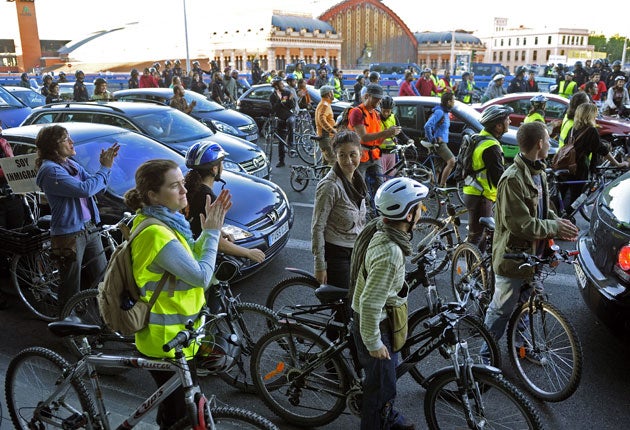Airlines cancelled flights, picketers blocked trucks from delivering produce and police clashed with protesters as Spanish workers staged a general strike today to protest austerity measures imposed by a government struggling to slash its budget deficit and overcome recession.
The stoppage was the opening salvo of a day of protest expected to see tens of thousands of people taking to streets in several European capitals to protest belt-tightening measures that unions see as punishing workers for a crisis they consider to have been triggered by bankers and traders.
The government and unions gave widely differing views of the Spanish strike's success.
The two main unions said the strike was being heeded by 70 per cent of employees and was a clear signal to the government to retract the reforms.
Though Labour Minister Celestino Corbacho declined to give an overall figure for strike participation, he said only 7 per cent of civil servants had taken part and just 20 per cent of transport workers. But he acknowledged that energy consumption was down by 16 per cent, levels typical of a Saturday.
In Getafe, a town outside Madrid, a police officer fired shots into the air to disperse protesters outside a factory, while in central Barcelona, students burned a police car and blocked streets with rubbish containers and officers fired rubber bullets, Corbacho said. Four people were detained in the clashes.
Spain's national carrier Iberia said it expected to operate only 35 per cent of its scheduled flights. Ryanair said it cancelled all its domestic flights in Spain and most international flights to and from the country. The protest left Madrid's Barajas aiport all but deserted of passengers.
In the city, buses were extremely scarce but the subway appeared to be functioning almost as normal.
Eighty per cent of Spain's high-speed train trips were cancelled, all mid-distance were scrapped and only 25 per cent of commuter trains were running. Rubbish went uncollected in many areas
Picketers roamed the streets of downtown Madrid, trying to go into offices with pamphlets explaining to workers why they should not work. At midday, a group of about 100 strikers blocked Madrid's Gran Via, a major commercial thoroughfare, and merchants shuttered their shops when picketers approached. Tourists took photographs of the unfolding drama.
Spain's first general strike since 2002 marks a bitter split in the usually close relationship between unions and Spain's Socialist government, which is struggling with a 20 per cent jobless rate and a bloated deficit that has prompted market worries it might end up in the kind of dire straits that forced a massive bailout for Greece.
The stoppage was called to protest austerity measures that include wage cuts for civil servants, a freeze on most retirement pensions and labour market reforms that make it easier and cheaper for companies to lay people off.
"The strike was not called to topple the government but it's up to the government if it wants to stay there," said Ignacio Fernandez Toxo, head of the Workers Commissions union, who called for the measures to be scrapped.
Strikers braving the pre-dawn chill staged a sit-in outside a garage housing buses in the Spanish capital, screaming "scabs" at drivers trying to get out onto the road. Some scuffled with police.
"We are here to explain to our colleagues the reason for the strike and urge them to take part and not work," said one striker, Mercedes Ramirez, amid a din of whistles and bullhorns.
Protesters prevented trucks from delivering fruit, vegetables, meat and fish to the main wholesale markets in Madrid, Barcelona and other major cities.
Corbacho said that in regions where unions had agreed to provide at least a minimum of services in areas such as public transport, those minimums were being honored at almost 100 percent.
Several regional television stations halted broadcasts shortly after midnight as staffers honored the strike.
Newspapers were also affected, with today's editions running fewer pages but few press kiosks open to sell them.
Not everybody agreed with the strike call. Laura de la Fuente, a 24-year-old travel agent, said she disagreed with unions "and what is more, the situation in Spain is so bad we cannot miss a day of work." In Spain, workers who strike are automatically docked that day's pay.
Subscribe to Independent Premium to bookmark this article
Want to bookmark your favourite articles and stories to read or reference later? Start your Independent Premium subscription today.


Join our commenting forum
Join thought-provoking conversations, follow other Independent readers and see their replies